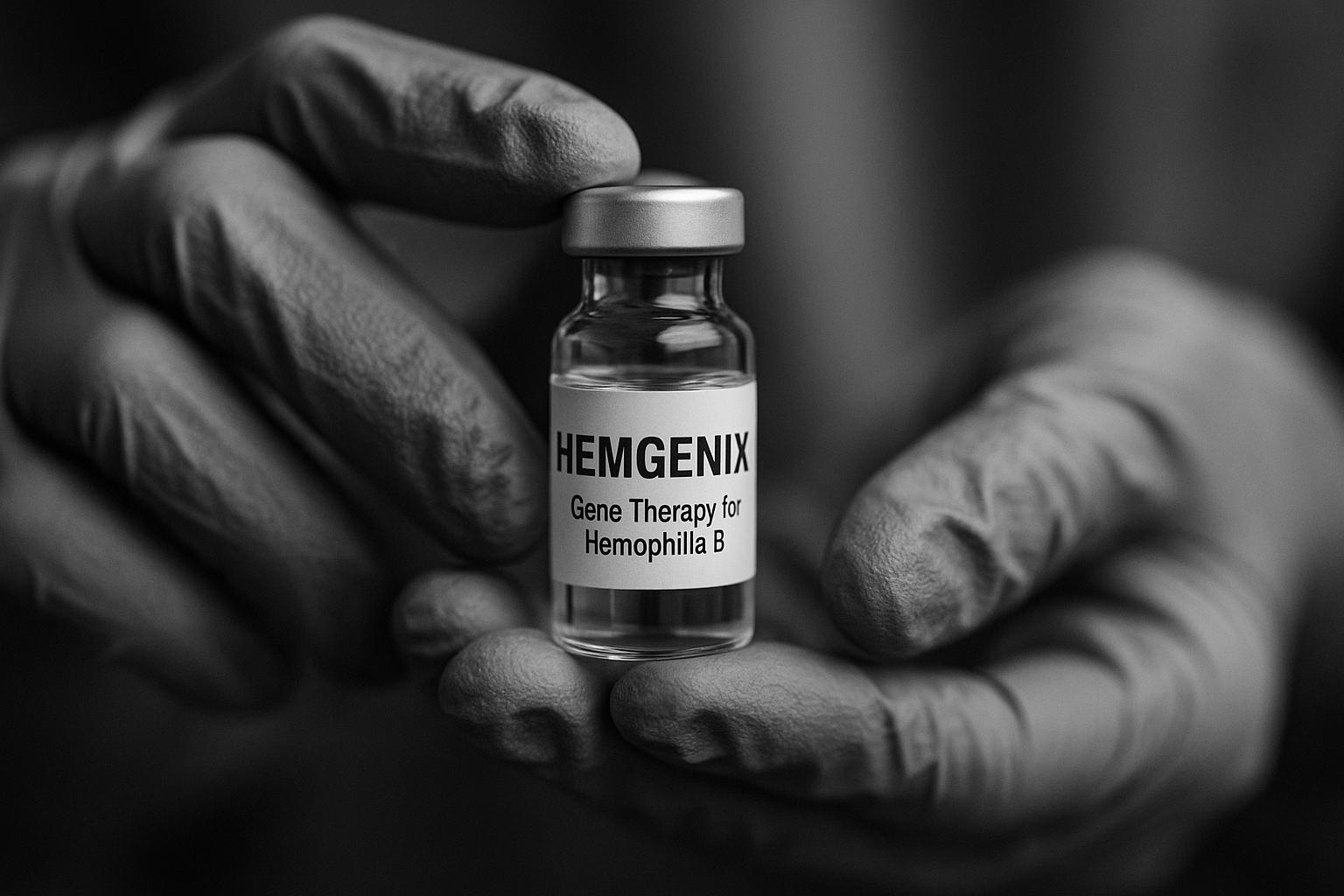A 44-year-old man becomes the first NHS patient to receive Hemgenix, a £2.6 million one-time gene therapy for haemophilia B, promising to replace lifelong injections and transform treatment despite ongoing cost and safety debates.
A 44-year-old man has become the first patient on the NHS to receive Hemgenix, a groundbreaking gene therapy hailed as the “world’s most expensive drug.” Administered at St Thomas’ NHS Foundation Trust in London, the single intravenous infusion treatment for haemophilia B costs an estimated £2.6 million per patient. This therapy replaces a defective gene responsible for insufficient production of clotting factor IX (FIX), a protein critical to blood clotting. Haemophilia B patients face severe risks of uncontrollable bleeding, even from minor injuries, and may suffer dangerous spontaneous bleeds without direct trauma.
Until now, patients with the condition required lifelong weekly injections of artificial clotting factors to manage their symptoms. The newly treated patient, who was diagnosed in infancy, described anticipation of a new life free from constant treatment planning and anxiety. “To experience a life free of the worry and to do things that I wouldn’t normally do will also be amazing,” he told MailOnline, reflecting the transformative potential of the therapy.
Medical experts and patient advocates have welcomed the NHS rollout as a major leap forward. Dr Pu-Lin Luo, the consultant haematologist who administered the treatment, called it “an exciting step” for haemophilia B management and a testament to gene therapy advancements in the UK. Kate Burt, CEO of The Haemophilia Society, emphasised that the one-time infusion will allow eligible patients to “expand their horizons and live life to the full,” alleviating the burdens of frequent intravenous treatments.
Hemgenix’s approval was granted in the UK last year but yesterday marked its first use outside clinical trials by the NHS. The gene therapy, developed by CSL Behring, integrates a functional gene into patients’ liver cells, enabling the body to produce FIX naturally. Clinical studies have shown its protective effect against bleeding lasts for at least three years, with hopes for longer durability.
There are approximately 2,000 people with haemophilia B in the UK, though only around 260 with moderate or severe disease currently qualify for Hemgenix treatment under NHS eligibility criteria. Although the upfront cost is high, experts argue that over a patient’s lifetime, Hemgenix could be more cost-effective than standard care. Regular factor IX injections cumulatively cost up to £8 million per patient, excluding expenses linked to emergency interventions and surgeries. The NHS secured the drug at a confidential discount, suggesting a lower actual cost.
The introduction of Hemgenix aligns with other recent advances in gene therapies for rare blood disorders. For instance, the NHS has recently approved Casgevy, a £1.7 million CRISPR-based treatment for beta-thalassemia, marking the first UK and European use of gene editing technology. These innovations stem from growing confidence in genetic therapies despite their steep initial investment.
However, uncertainties remain. The UK’s National Institute for Health and Care Excellence (NICE) previously advised against routine NHS funding of Hemgenix due to limited long-term efficacy data and cost-effectiveness concerns. They noted difficulties in comparing Hemgenix directly with conventional factor IX replacement therapies, and the long-term benefits are still being evaluated. Patients using Hemgenix require close monitoring, especially liver function tests, to detect potential immune responses or complications. There is also a theoretical cancer risk since the gene integrates into cellular DNA, though clinical trials have not indicated any malignancies to date.
Globally, other gene therapies for haemophilia B are emerging, underscoring the competitive and rapidly evolving field. The European Medicines Agency (EMA) recently recommended conditional approval for Pfizer’s Durveqtix, a gene therapy that similarly boosts clotting protein production, priced higher at $3.5 million in the US. This therapy showed promising trial results, reducing bleeding episodes more effectively than standard infusions, and awaits formal EU approval.
Ultimately, Hemgenix represents a milestone in personalised medicine, blending cutting-edge science with complex healthcare economics and patient care considerations. As more patients gain access, ongoing monitoring and research will be crucial to understanding the therapy’s long-term impact and ensuring its benefits reach those living with haemophilia B.
 Reference Map:
Reference Map:
- Paragraph 1 – [1], [6]
- Paragraph 2 – [1]
- Paragraph 3 – [1]
- Paragraph 4 – [1]
- Paragraph 5 – [1], [6]
- Paragraph 6 – [1], [4]
- Paragraph 7 – [1], [4]
- Paragraph 8 – [5], [7]
- Paragraph 9 – [2], [3]
Source: Noah Wire Services
Verification / Sources
- https://www.dailymail.co.uk/health/article-14824811/worlds-expensive-drug-NHS-haemophilia-therapy-patient-london.html?ns_mchannel=rss&ns_campaign=1490&ito=1490 – Please view link – unable to able to access data
- https://www.reuters.com/business/healthcare-pharmaceuticals/eu-regulator-recommends-use-pfizers-gene-therapy-rare-bleeding-disorder-2024-05-31/ – The European Medicines Agency (EMA) has recommended the conditional marketing authorization of Pfizer’s gene therapy for hemophilia B, a rare bleeding disorder requiring regular infusions of a blood-clotting protein. This decision follows approvals in the United States and Canada, where the therapy is branded Beqvez. The therapy, set to be sold as Durveqtix in the EU, costs $3.5 million in the U.S., mirroring the price of CSL Ltd’s rival therapy, Hemgenix. Hemophilia B primarily affects males, causing faulty production of clotting proteins, leading to severe bleeding. The gene therapy aims to stimulate the patient’s body to produce the clotting protein factor IX (FIX), reducing the need for frequent infusions. A late-stage trial demonstrated the therapy’s efficacy, eliminating bleeding in 60% of patients compared to 29% who received standard infusions. Pfizer will monitor the therapy’s long-term durability and safety for 15 years. More than 38,000 people globally are affected by hemophilia B. The EMA’s approval recommendation now awaits formal approval by the European Commission. (reuters.com)
- https://www.axios.com/2022/11/23/fda-approves-gene-therapy-for-hemophilia – The Food and Drug Administration (FDA) has approved a gene therapy called Hemgenix for treating hemophilia B, a rare inherited blood disorder. Hemgenix, produced by CSL Behring LLC, will become the world’s most expensive therapy with a list price of $3.5 million. Hemophilia B affects around one in 40,000 people and is characterized by missing or insufficient levels of a protein needed for blood clotting. This approval follows the FDA’s recent endorsement of two other costly gene therapies: Zynteglo for beta-thalassemia and Skysona for cerebral adrenoleukodystrophy. These advances represent significant progress in personalized medicine but also raise concerns about the cost implications for the healthcare system. (axios.com)
- https://www.ft.com/content/061c5c18-487d-44aa-89e2-fe692b40c63d – The NHS in England has approved a £1.7 million Crispr gene-editing treatment, Casgevy, for patients with the rare blood disorder beta-thalassemia. This decision by the National Institute for Health and Care Excellence (NICE) marks the first use of Crispr gene editing technology in Europe. Developed by Vertex Pharmaceuticals and Crispr Therapeutics, Casgevy edits patients’ cells to enable the production of healthy red blood cells. Up to 460 NHS patients eligible for blood and bone marrow transplants will benefit from this treatment, particularly those of Pakistani, Indian, and Bangladeshi origin. Despite its high cost, a confidential agreement ensures the treatment is provided at a discount. The Innovative Medicines Fund will finance this initiative while more data on cost-effectiveness is gathered. (ft.com)
- https://hemophilianewstoday.com/news/nhs-advised-not-to-cover-hemophilia-b-gene-therapy-hemgenix/ – The National Institute for Health and Care Excellence (NICE) in the UK has advised against covering Hemgenix, a gene therapy for hemophilia B, due to uncertainties regarding its effectiveness and cost-effectiveness. NICE’s evaluation committee highlighted that while Hemgenix reduces bleeding episodes, there is insufficient evidence on its long-term efficacy, leading to highly uncertain cost-effectiveness estimates. The committee also noted issues with the indirect comparison between Hemgenix and factor IX replacement therapies. Hemophilia B is a genetic bleeding disorder resulting from missing or insufficient levels of blood clotting factor IX, a protein needed to produce blood clots to stop bleeding. Patients with moderate-to-severe hemophilia B typically require a routine treatment regimen of intravenous (IV) infusions of factor IX replacement products to maintain sufficient levels of clotting factor to prevent bleeding episodes. (hemophilianewstoday.com)
- https://en.wikipedia.org/wiki/Etranacogene_dezaparvovec – Etranacogene dezaparvovec, sold under the brand name Hemgenix, is a gene therapy used for the treatment of hemophilia B. It is an adeno-associated virus vector-based gene therapy that carries a gene for clotting Factor IX, expressed in the liver to produce the Factor IX protein, thereby increasing blood levels and limiting bleeding episodes. Hemophilia B is a genetic bleeding disorder resulting from missing or insufficient levels of blood clotting Factor IX. The most common adverse reactions include liver enzyme elevations, headache, mild infusion-related reactions, and flu-like symptoms. Etranacogene dezaparvovec was approved for medical use in the United States in November 2022, in the European Union in February 2023, and in Canada in October 2023. (en.wikipedia.org)
- https://hemgenix.eu/clinical-evidence – HEMGENIX® (etranacogene dezaparvovec) is a gene therapy for hemophilia B that has demonstrated safety and efficacy in pivotal phase 3 clinical trials. The most frequent treatment-related adverse events were mild, including infusion-related reactions (IRR) and transient liver enzyme elevations. IRRs occurred in 12.3% of patients, with the majority being mild and resolving on the same day. All treatment-related ALT elevations were non-serious and resolved with a course of corticosteroid treatment. Patients are monitored weekly for liver enzyme elevations in the first three months following HEMGENIX® administration. (hemgenix.eu)
Noah Fact Check Pro
The draft above was created using the information available at the time the story first
emerged. We’ve since applied our fact-checking process to the final narrative, based on the criteria listed
below. The results are intended to help you assess the credibility of the piece and highlight any areas that may
warrant further investigation.
Freshness check
Score: 8
Notes: The narrative reports on the first NHS administration of Hemgenix in London, with an estimated cost of £2.6 million per patient. Hemgenix was approved in the UK in February 2023, and the first patient in Austria was treated in April 2025. The earliest known publication date of similar content is June 2023. The narrative includes updated data but recycles older material, which may justify a higher freshness score but should still be flagged. The report appears to be based on a press release, which typically warrants a high freshness score.
Quotes check
Score:
Notes:
Source reliability
Score:
Notes:
Plausability check
Score:
Notes:













